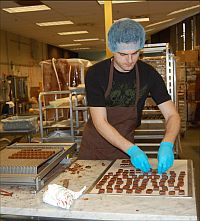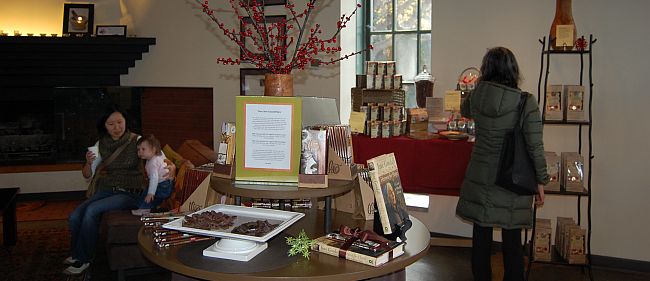 Photo: Sarah van Schagen
Photo: Sarah van Schagen
Stroll into Theo Chocolate in Seattle’s artsy Fremont neighborhood, and you’re bound to feel all warm and cozy. From the freshly made confections beckoning from behind the counter to the welcoming brick fireplace and mugs of hot cocoa (a new addition this winter), the storefront offers a respite from the winter chill.
But descend the stairwell into the belly of the chocolate factory on one of their daily tours — adjusting your blue hairnet along the way — and you might end up more than a little disappointed. For starters, there are no chocolate waterfalls. There are no impossibly tiny doorways or glass elevators. And there are definitely no Oompa-Loompas.
With Theo’s innovative offerings ranging from a coconut curry milk chocolate bar to a fig, fennel, and almond dark, there’s plenty of pure imagination here. But this isn’t your Willy Wonka’s chocolate factory.
It’s Joe Whinney’s, actually.
Anything you want to, do it / Want to change the world? / There’s nothing to it
Theo’s delightful founder fell in love with the cacao plant while doing conservation work in Central America. In the early ’90s, he brought the first supply of organic cocoa beans into the United States. And in 2006, he opened the country’s first organic and fair trade bean-to-bar chocolate factory.
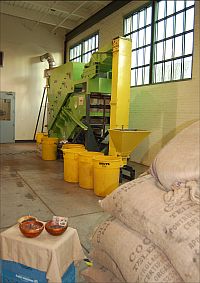 “It’s been a long-term dream of mine to use business to change the world in a positive way,” Whinney told me after a recent tour of the factory. “I have a deep passion for food and for cocoa, and that’s why we’re making chocolate.”
“It’s been a long-term dream of mine to use business to change the world in a positive way,” Whinney told me after a recent tour of the factory. “I have a deep passion for food and for cocoa, and that’s why we’re making chocolate.”
Theo’s award-winning chocolate bars and confections are made with pure ingredients that are grown sustainability — and locally, if possible. The cocoa beans come directly from farmers and grower cooperatives with whom Theo has built long-term business relationships. The finished products are wrapped in sustainable packaging and printed with educational messages about Theo’s commitment to quality ingredients.
Whinney has since moved beyond traditional organic and fair trade standards to pursue what he calls “the most comprehensive environmental, social, and economic criteria specifically for cocoa growing and production.”
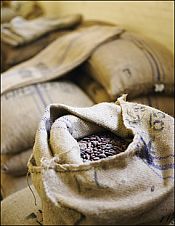 Created in partnership with Starbucks, Cocoa Practices is an open-technology tool aimed at encouraging true sustainability by focusing on just one plant — Theobroma cacao, or cocoa beans — as opposed to the relatively generic organic and fair trade standards that are applied to a wide range of agricultural products.
Created in partnership with Starbucks, Cocoa Practices is an open-technology tool aimed at encouraging true sustainability by focusing on just one plant — Theobroma cacao, or cocoa beans — as opposed to the relatively generic organic and fair trade standards that are applied to a wide range of agricultural products.
“We’re not trying to replace either one,” Whinney says, “but we do want to push the envelope.”
The hope is that the Cocoa Practices initiative will help growers produce high-quality cacao while protecting wildlife and natural resources in the sensitive tropical rainforest ecosystems where they farm and live. The tools have been several years in the making, but Whinney will soon find out how effective they’ll be.
Good for all
Next year, Cocoa Practices will be rolled out for the first time in Tanzania as part of a partnership with the Jane Goodall Institute.
 Founded by the renowned primatologist, JGI does much more than protect Goodall’s famed chimpanzees; the nonprofit recently launched a “Good for All” program that recognizes “high quality, ethically produced products from the developing world” by stamping them with what is essentially Goodall’s seal of approval.
Founded by the renowned primatologist, JGI does much more than protect Goodall’s famed chimpanzees; the nonprofit recently launched a “Good for All” program that recognizes “high quality, ethically produced products from the developing world” by stamping them with what is essentially Goodall’s seal of approval.
Two new Theo bars — a milk and a dark — now sport the seal. For each bar purchased, about 25 cents is donated to JGI’s efforts to protect chimpanzees, foster community-based conservation projects, and create youth education programs across the globe.
Whinney considers the JGI collaboration a serendipitous moment. “[JGI] understands that a large part of conservation is to make sure that farmers who are environmental stewards are farming in a way that is beneficial to the environment but also provides an income sufficient for them to have a good life without them having to make poor land stewardship decisions. … And that’s been a core part of my philosophy for years.”
Bean town
Another partnership that has proved serendipitous (albeit much more locally) is Theo’s recent collaboration with Caffé Vita, a respected Seattle company hawking a different kind of bean altogether.
“Between the coffee culture here and now the chocolate culture, you might as well have two bean roasters come together to make great products,” Whinney says.
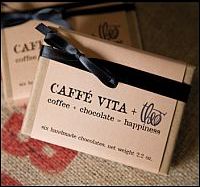 Said products so far include a coffee-flavored chocolate bar and coffee-based confections (like Café Au Lait and Hazelnut Mocha) as well as the Coffee + Chocolate of the Month Club, which delivers hand-selected coffee blends paired with Theo chocolates.
Said products so far include a coffee-flavored chocolate bar and coffee-based confections (like Café Au Lait and Hazelnut Mocha) as well as the Coffee + Chocolate of the Month Club, which delivers hand-selected coffee blends paired with Theo chocolates.
The collaboration was born out of a “long-standing mutual appreciation” and began with conversations over meals, visits to each other’s facilities, and many, many tastings, says Michael Hebb, a Caffé Vita representative who works on special projects.
Similarities between the two companies don’t end with the roasting process; they both share the same commitment to sustainability. Vita’s Farm Direct promise means checks are handed directly to farmers — not a broker — and purchases are made by the container-ship-ful rather than a few bags at a time. Once the coffee beans hit land, they’re delivered via biodiesel truck. In the Vita cafes, coffee grounds are composted after use and the company also hopes to offer compostable cups soon, Hebb says.
“[Vita’s] focus on quality and integrity is higher than any other coffee company that I’ve come across,” Whinney says. “That’s important to us.”
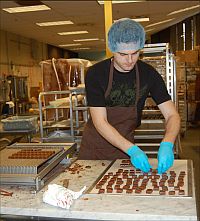 Sweet dreams
Sweet dreams
It’s clear during our conversation that Whinney’s commitment to quality is unwavering. “You cannot have environmental or social sustainability at the farm,” he says, “unless you’re producing a product that people really want to buy — very, very high quality.” And this commitment comes through in his chocolate creations, as well.
During our jaunt through the factory, the tour guide announces that she’s just learned that we have taste buds all over the inside of our mouth — not just on our tongue. And after tasting all those delectable samples, I’m pretty sure I believe it.
